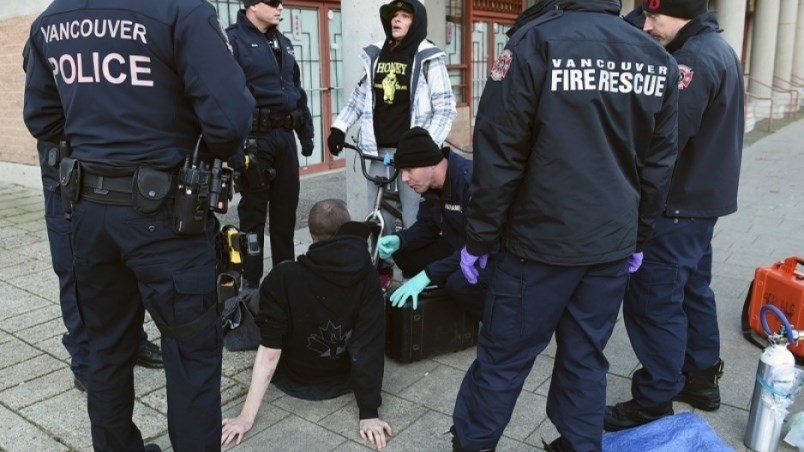B.C. health officials insist they will be closely monitoring the first decriminalization policy in Canada for otherwise illegal street drugs, beginning Tuesday.
The province’s upcoming decriminalization policy is an exemption from the , allowing adults to freely possess a so-called personal amount — less than 2.5 grams — of drugs, including opioids (such as heroin, morphine and fentanyl), crack and powder cocaine, methamphetamine and MDMA.
At a news conference Monday in Vancouver, federal Minister for Mental Health Carolyn Bennett joined counterpart B.C. Minister of Mental Health and Addictions Jennifer Whiteside and provincial health officer Dr. Bonnie Henry.
Bennett said the three-year pilot policy will work in concert with other measures to reduce the opioid drug death crisis, an ongoing provincial health emergency. Bennett noted 20 Canadians died of opioid toxicity each day in the first six months of 2022.
In B.C., death rates are more than double the national average and have gotten worse since March 2020, during the COVID-19 pandemic. In the first nine months of 2022, 1,644 British Columbians died as a result of illicit drugs (about six people per day). Last year, 70 per cent of those who died were between the ages of 30 and 59, and 78 per cent were male.
Decriminalization means these small amounts of drugs will not be seized by B.C. police and no criminal charges can come from such possession, with some exceptions. It is seen as a means to reduce such deaths, by reducing a drug user’s need to acquire more drugs and provide them opportunities for health treatments, instead of going through a law enforcement process.
“Instead of being treated as a criminal, they will be treated with care and compassion. It will help break down stigma; the fear and shame around substance use,” said Whiteside.
Speaking at the conference was Kathryn Botchford, widow of , who died in August 2020 at age 48, leaving three young daughters.
Jason hid his substance use, she said, adding that for a time “his secret became my secret.”
“The coroner reminded me how often it is middle-age men who hide substance use,” she said.
Henry, who released a report , called Tuesday a “momentous day.”
B.C. police departments are in favour of the policy.
“Addictions and substance use are health matters,” said Fiona Wilson, vice-president of the BC Association of Chiefs of Police, which oversees 9,200 member officers.
Police can now focus on importers and traffickers of drugs, said Wilson, adding de facto decriminalization has been in effect for a number of years. It’s “extremely rare” for anyone to be charged with personal amounts, she said.
B.C. police departments are now training officers to provide those in possession of small amounts of drugs with information on health and social supports, as well as local treatment and recovery options.
The selling of these drugs remains illegal, regardless of the amount. These small amounts of drugs may also not be carried by youth under 18 nor by anyone on school grounds or in certified airports. Such drugs may also not be readily accessible to an operator of a vehicle or boat.
RCMP detachments and police chiefs from Metro Vancouver, Abbotsford, Saanich and Vancouver have begun training, according to the province.
Whiteside assured the public that drug users will be able to access treatment and social support when it’s offered by police.
Questions remain, however, as to how officials will be tracking the policy’s effectiveness.
Officials are unable to provide data on how many times people have had 2.5 grams of drugs seized. They stated they are still in process of getting data on seizures, convictions and police interactions.
With few specific details provided, officials claim qualitative and quantitative data on health, criminal justice, trends in substance use and understanding of stigma will also be collected and reported publicly on a quarterly basis.
“We’ll be in a much more dynamic process as we roll this out,” said Whiteside.
Is 2.5 grams enough?
One of the most frequent questions surrounding the policy is the 2.5-gram threshold: many advocates of drug policy reform say it’s too low. Henry’s team initially asked for it to be 4.5 grams but the Canadian Association of Chiefs of Police reportedly wanted one gram and the federal government settled on 2.5 grams.
University of B.C. drug use and policy researcher Eugenia Oviedo-Joekes has called into question the threshold because it will likely disadvantage addicts who use repeatedly during the day.
“If I want to use myself, do I got to the dealer every single time I need a personal use amount?” she asked, adding rural drug users will especially face such issues.
Brittany Graham, executive director of Vancouver Area Network of Drug Users, said the 2.5-gram threshold is too low, meaning drug users may alter their purchasing techniques.
“You buy groceries in bulk, so why wouldn’t you buy drugs in bulk?” said Graham.
Police officers need to be more aware of drug use practicalities, as well, said Graham. For example, the decriminalization policy still allows for police to seize drugs they suspect could be sold. But, said Graham, items such as scales and baggies are likely more a means of harm reduction than trafficking, which is what they may be interpreted for.
Graham said police officers will continue to be faced with difficult discretionary decisions and that 18 grams would be a more adequate threshold.
“We need to look at that 2.5 as not set in stone so we don’t marginalize people who are in need of these medications to get through the days,” said Oviedo-Joekes.
In Portugal, street drugs are decriminalized up to 10 doses, noted Oviedo-Joekes.
With the hope officials are open to revisiting the 2.5-gram threshold, Oviedo-Joekes said overall, the policy “is good news.”
“Let’s not lose focus on that but there’s still so much to do,” she said.

